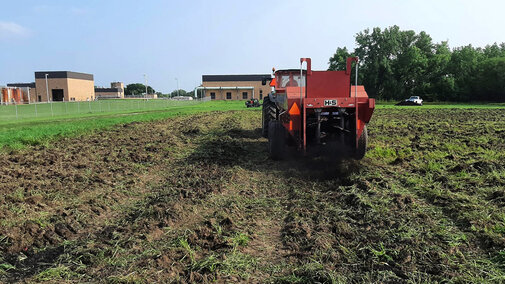The inaugural Great Plains Biochar Conference is set for Tuesday, Sept. 24–Thursday, Sept. 26, 2024, at the Graduate Hotel in Lincoln, Nebraska. The University of Nebraska–Lincoln, the Nebraska Biochar Initiative and the Nebraska Forest Service will serve as hosts.
This conference brings together a diversity of professionals working with biochar in research, education, agricultural application, production, industries, and trade to discuss how to bring biochar to its full potential.
Biochar, or charcoal, is produced by burning organic waste material such as wood residues, cornstalks, nut shells or grass clippings under limited oxygen.
The technology goes back to the discovery of regions in the Amazon of dark fertile soil called terra preta, or dark earth. This soil developed due to the addition of charcoal, bones, compost, and other materials to the low fertility soils naturally occurring in the tropics by indigenous communities several hundred years ago.
Depending on feedstock and production conditions, biochar can consist of more than 80% organic carbon, is highly porous and has a large specific surface area because of the small particle sizes. Applied to soil, biochar resist decomposition for several decades or longer, which makes it one of the most efficient materials to store carbon in the long-term.
As a soil conditioner in agricultural or urban settings, biochar can also improve the retention of water and nutrients in soils helping to develop more resilient and resource efficient production systems. Beyond that, biochar gains increased attention to be used for remediation and decontamination procedures, within green infrastructure for storm water management and urban green space, as an amendment in construction material or an additive in compost production.
Based on its unique characteristics and multi-purpose applications, biochar can decrease the carbon imprint of municipal, industrial and agricultural operations and becomes increasingly relevant as an asset in the carbon credit market.
“The city of Lincoln is currently building a biochar plant to supply the growing demand,” said Michael Kaiser, agronomy and horticulture assistant professor for applied soil chemistry at Nebraska. “Building on this momentum, we are looking forward having more than two days of discussion and exchange about newest data, ideas, and developments in all those areas where biochar is becoming increasingly relevant due its unique characteristics.”
Conference organizing committee includes: Kaiser; Nash Leef, owner of Flatwater Carbon; Kim Slezak, Nebraska Forest Service forest products specialist; and Frank E. Uhlarik, regional brownfields manager at Terracon Consultants.
Additional information and registration can be found on the Department of Agronomy and Horticulture site.

